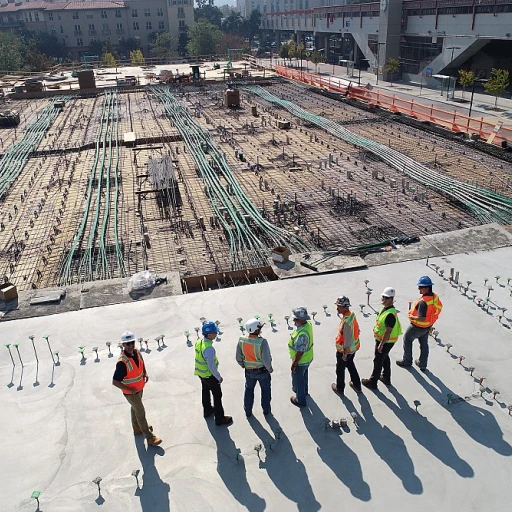Understanding Industry Automation
The Rise of Automation in Industry: Transforming Processes and Operations
The transformation of industries through automation is not a new phenomenon, but its acceleration in recent years has been remarkable. At the core of this evolution is the ability of technology to streamline processes, reduce manual efforts, and ultimately modernize operations. As industries modernize, the integration of automation is paving the way for significant changes.
Automation infiltrates various sectors, from manufacturing to services, driving efficiency by automating routine processes that were traditionally done manually. This shift enables businesses to enhance productivity and allocate human resources to more complex and creative tasks. When industries automate, they often see not only cost savings but also an improvement in the quality of their outputs.
However, this transition is not without its challenges. The changing landscape requires a thoughtful approach to ensure that while processes become efficient, the human element is not lost. As Eric Hoffer famously remarked, "In times of change, learners inherit the earth; while the learned find themselves beautifully equipped to deal with a world that no longer exists." This quote emphasizes the importance of adaptability in the face of automation's rise.
For businesses, the decision to join the automation bandwagon is as much about competing effectively in the market as it is about surviving the ongoing technological tides. Leadership must embrace the potential of new technology while mindful of privacy policy, ethical considerations, and the evolving needs of its workforce. Navigating the future of work means preparing for a time when automation is ubiquitous.
As these industries continue to adapt to modern advancements, it is crucial to explore the broader implications of unlocking the power of work automation. These shifts will redefine not just the daily operations of businesses but also the roles within them, offering a complex interplay of challenges and opportunities.
The Evolution of Job Roles
The Shift from Manual Processes to Automated Solutions
As industries modernize, the evolution of job roles becomes inevitable. With the rise of technology, we witness a significant shift from manual processes to automated solutions. The need for traditional tasks is declining, giving way to more tech-driven responsibilities.
This transformation raises important points about the nature of work. It leads to new opportunities and, at times, challenges. For example, some routine tasks are being automated, resulting in a necessity for employees to upskill or reskill. However, this transition doesn't entirely remove the human element in the workforce. Instead, it changes the way individuals engage with their work tasks.
Adapting to Changing Job Requirements
In the current landscape, the roles within industries are changing at an unprecedented rate. When industries automate, there's a substantial focus on jobs that combine human creativity, problem-solving, and technological know-how. Therefore, workers are prompted to adapt, acquiring proficiencies that align with emerging technologies.
As Eric Hoffer insightfully observed, the persistence to innovate is crucial in exploring the future of job automation. His philosophy highlights that in a time of change, it is the learners who will thrive, as they adjust to new realities while others may struggle. This shift is not just about survival; it's about thriving in an evolving job market.
The Role of Businesses in Workforce Transformation
Businesses play a pivotal role in facilitating this evolution. Leadership within organizations must implement strategic initiatives to help employees transition into new roles effectively. When businesses invest in training programs and support systems, they not only modernize but also empower their workforce to excel in a dynamic environment.
The shift toward automation is not without challenges, especially when it comes to policy and ethical considerations. As businesses and individuals navigate these changes, a balanced approach that recognizes the importance of both technology and the human touch becomes essential. Ultimately, the evolution of job roles urges us to reflect on the quotes and insights of visionaries like Hoffer, who emphasize the vitality of continuous learning and adaptation in our professional lives.
Skills for the Automated Future
The Skills You Need as Automation Takes Over
As industries continue to modernize, the rise of automated processes is becoming increasingly evident. Among the most significant changes is the evolution of skills needed in a world where technology plays a pivotal role. In the past, manual processes dominated many sectors, but as the need to automate becomes more pronounced, a shift in skill requirements is inevitable.
Adapting to this change requires a new set of tools and an open mindset. Here are key points that highlight the skills necessary for thriving in an automated future:
- Technical Proficiency: As technology and industry converge, understanding automated systems' technical aspects is crucial. From coding to troubleshooting automated workflows, the ability to interact with technology hands-on is beneficial.
- Analytical Thinking: Organizations increasingly rely on data to drive decisions. Skills in data analysis and strategic thinking enable individuals to make informed decisions, optimize systems, and improve efficiency in automated settings.
- Adaptability and Continuous Learning: When automation takes place, industries evolve quickly. The ability to adapt and continuously learn new skills ensures that employees remain relevant as technologies and job demands change.
- Collaboration and Communication: While automation enhances efficiency, it is the collaborative efforts of individuals that drive innovation. Strong communication skills are essential for working in diverse teams and bridging gaps between human and machine interactions.
- Ethical Considerations and Privacy: In an era where data is crucial, understanding privacy policies and the ethical implications of automation becomes important. Knowledge of ethical frameworks ensures that decisions made with technology respect privacy and societal norms.
These skills are not just instrumental in securing a job but also staying competitive in a time when industries continue to evolve rapidly. For further insights into how job roles are changing due to automation, feel free to visit our article on job automation.
It's a pivotal time for individuals and businesses to embrace the change and move forward with a proactive approach, as articulated in some thought-provoking quotes like the one from Eric Hoffer: "In times of change learners inherit the earth; while the learned find themselves beautifully equipped to deal with a world that no longer exists."
Challenges and Opportunities for Businesses
Navigating the Changing Business Landscape
Automating industries is not just about integrating technology with manual processes; it's about fundamentally changing the way businesses operate. As businesses modernize, they encounter both challenges and opportunities that shape their ability to compete in an increasingly automated world.- Strategic Planning: When industries decide to automate, a well-thought-out strategy is crucial. This involves not only financial investments but also understanding the impact on current workflows and employees. Successfully navigating these changes requires forward-thinking leadership that can guide businesses through the transition.
- Investment in Technology: As the industry continues to evolve, businesses must invest in the latest technology to remain competitive. This means keeping abreast of emerging trends and regularly assessing current systems to ensure they are not becoming outdated. Technology should serve to enhance business capabilities, rather than merely replace existing processes.
- Employee Skills and Training: As discussed in our previous sections, the evolution of job roles demands new skills from the workforce. Businesses have the challenge of upskilling current employees while also scouting for new talents who are adept at working with modern technologies.
- Balancing Human Element: While automating life can streamline operations, maintaining a human touch in customer interactions is vital. Businesses need to find ways to incorporate this element in their increasingly automated processes, ensuring that customer satisfaction does not suffer.
- Threats to Privacy and Security: With automation comes increased data processing, raising concerns about the terms privacy and data protection. Businesses need to have robust policies to safeguard sensitive information, adhering to ethical practices while keeping up with technological advancements.
The Human Element in Automated Industries
The Human Touch in a World of Automation
In the rapidly evolving landscape of automated industries, the human element remains a pivotal component. While technology continues to modernize and automate processes, it is the human touch that often provides the creativity and emotional intelligence that machines cannot replicate. This dynamic is crucial when businesses aim to balance efficiency with the need for human-centric solutions.
As industries modernize, they face the challenge of maintaining a workforce that can adapt to changing technologies. The transition from manual processes to automated systems requires not only technical skills but also the ability to work collaboratively and think critically. In this context, leadership plays a significant role in guiding teams through these transformations, ensuring that employees feel valued and engaged.
Leadership and Emotional Intelligence
Leadership in automated industries must focus on fostering an environment where employees can thrive alongside technology. This involves cultivating emotional intelligence and encouraging a culture of continuous learning. Leaders who prioritize these aspects can help bridge the gap between technological advancements and the human workforce, creating a more harmonious and productive work environment.
Moreover, as industries automate life and streamline processes, the importance of ethical considerations cannot be overstated. Businesses must navigate the fine line between leveraging technology for efficiency and maintaining a commitment to ethical practices. This includes respecting privacy policies and ensuring that automation does not lead to the primitivization of the workforce.
Balancing Efficiency and Human Needs
One of the most significant challenges is balancing the efficiency that automation brings with the needs and rights of the workforce. As Eric Hoffer once noted, "In times of change, learners inherit the earth, while the learned find themselves beautifully equipped to deal with a world that no longer exists." This quote highlights the necessity for continuous adaptation and learning in an ever-changing industry landscape.
Ultimately, the future of work in automated industries will depend on the ability to integrate technology without losing sight of the human element. By prioritizing leadership, emotional intelligence, and ethical considerations, businesses can ensure a future where technology and humanity coexist and thrive.
Policy and Ethical Considerations
Balancing Innovation and Regulation
As industries modernize, the balance between innovation and regulation becomes crucial. Automating industries offer immense potential, yet they also bring forth challenges that require careful policy considerations. It's essential for leadership to ensure that the pace of technological advancement does not outstrip the development of ethical guidelines and privacy policies.
Privacy and Ethical Implications
With the automation of life and business processes, concerns around privacy and ethics become more pronounced. The terms of privacy policies must evolve to protect user data in an increasingly digital world. When industries automate, they must also consider the ethical implications of their actions, ensuring that technological progress does not come at the expense of human rights or dignity.
Adapting to Change
The quote by Eric Hoffer, "In times of change, learners inherit the earth, while the learned find themselves beautifully equipped to deal with a world that no longer exists," encapsulates the need for continuous adaptation. As industries modernize, businesses must be agile, adapting their policies to meet new challenges while seizing opportunities presented by automation.
Leadership in the Age of Automation
Effective leadership is vital when navigating the complexities of automating industries. Leaders must foster an environment that encourages innovation while ensuring that policies keep pace with technological changes. They must also recognize the human element, ensuring that employees are supported and equipped with the skills necessary to thrive in a changing landscape.
Conclusion: A Collaborative Approach
The future of work in automated industries requires a collaborative approach between policymakers, businesses, and employees. By aligning policy with technological advancements, we can ensure a future that benefits all stakeholders, balancing the promise of automation with the essential human touch.






